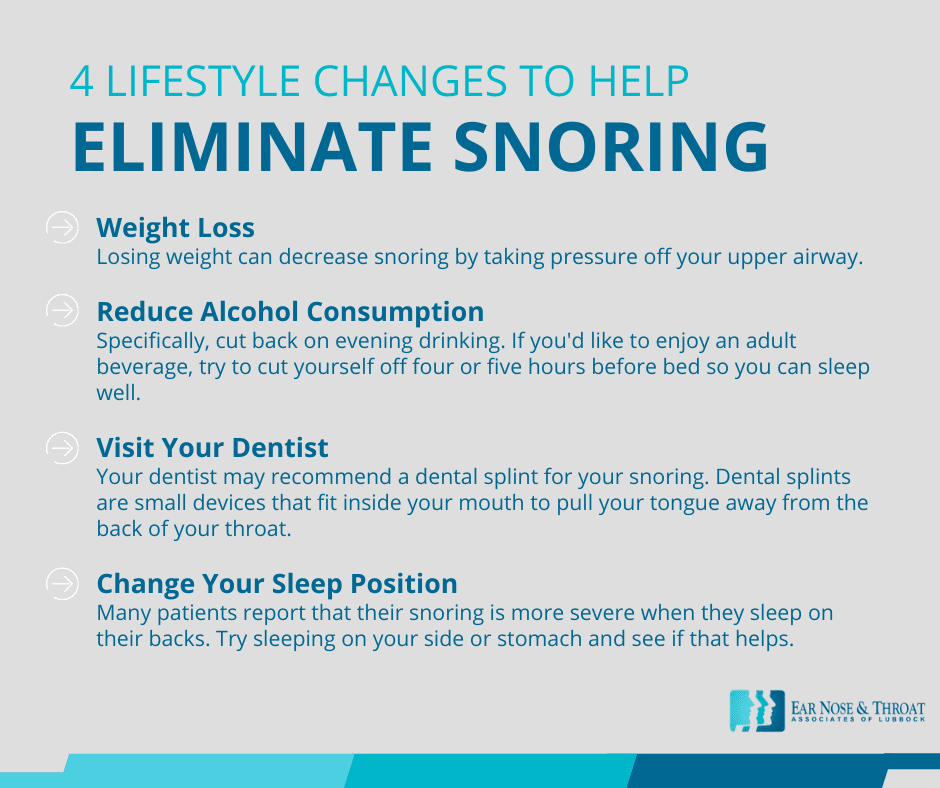How To Stop Snoring: A Doctor’s Comprehensive Guide

If you’re a chronic snorer, you’re probably used to ribbing from your spouse about how long they had to listen to your snores at night. You might have even earned an endearing nickname — like Tyranno-SNORE-us Rex.
In our ENT practice, it’s extremely common for patients to ask how to stop snoring because someone else is fed up. In fact, it’s much more common for snoring to bother household members rather than the snorer, who is usually blissfully unaware!
If it’s not interfering with your sleep, is snoring anything to worry about? Is snoring itself harmful?
Or has snoring become a relationship problem, more than a medical one, for you?
Is Snoring a Medical Problem?
Snoring isn’t necessarily a sign of a severe medical problem. In lots of cases, snoring really is more of a social problem than a medical one.
Making a bit of noise while sleeping is natural. This happens because the airway collapses a little when we lay down. As a general rule, men tend to snore more than women, though of course there are exceptions!
Sometimes, though, snoring can be a sign of sleep apnea. Sleep apnea is a sleep disorder that means you stop breathing many times per hour every night and can be accompanied by loud snoring.
Sleep apnea can make you feel really groggy during the day. Some patients don’t even realize how serious their exhaustion is until they doze off behind the wheel!
What Causes That Ruckus?
So you know that you snore, and you want to learn how to stop snoring. But what causes that maddening sound in the first place?
Snoring is just the sound of the tissues in your upper airway vibrating against each other. This happens when airflow becomes limited.
When you’re awake, your body is usually upright. Your muscles keep your airway open without you having to think about it.
But when you sleep, your muscles relax and your airway collapses slightly inward. Your tongue can fall to the back of your throat as well.
Common Causes of Snoring
This airway collapse and tongue movement can happen to anyone, but some people are more susceptible to snoring than others.
Probably the most common cause of snoring is weight gain. As we age, it’s easy to put on a few pounds without noticing much. But being heavier means more weight pressing on your airways when you lie down, and that can mean a more noisy snooze.
Additionally, some people like to have a couple beers or glasses of wine before bed to help them relax. But studies show that drinking alcohol in the evening actually leads to poorer sleep quality. So you may find that your snoring is worse after you knock a few back.
Blocked nasal passages also tend to worsen snoring. Nasal blockage can be due to allergies, nasal polyps, or the common cold.
And like many other physical symptoms, genetics can play a role in snoring too. Some people are just born with anatomical differences in the ways their jaws are shaped that can lead to snoring. People with larger tongues are also more prone to become snorers.

How To Stop Snoring
If you’re a chronic snorer who wants to stop, it’s best to see your ENT doctor to make sure the snoring is harmless. Your doctor can help you rule out sleep apnea as the cause of your snoring.
Once you know you’re dealing with run-of-the-mill snoring, you can make some lifestyle changes to help you snooze silently.
Weight Loss
Losing weight can decrease snoring by taking pressure off your upper airway.
Reduce Alcohol Consumption
Specifically, cut back on evening drinking. If you’d like to enjoy an adult beverage, try to cut yourself off four or five hours before bed so you can sleep well.
Consider a Visit to Your Dentist
Your dentist may recommend a dental splint for your snoring. Dental splints are small devices that fit inside your mouth to pull your tongue away from the back of your throat.
Ask your dentist if this option could be right for you, but know that sometimes dental splints can cause teeth to shift and do not work for all types of snoring.
Change Your Sleep Position
Many patients (and patients’ spouses!) report that their snoring is more severe when they sleep on their backs. Most of us are pretty attached to our sleeping positions, but try sleeping on your side or stomach and see if that helps.
What if I Still Snore After Making All These Changes?
If you’ve tried the lifestyle changes in the last section and still struggle to get a good night’s sleep, talk with your ENT doctor about a sleep study. Sleep studies help doctors pinpoint the issue that’s causing your snoring.
If your care provider determines that sleep apnea is causing your snoring, they may prescribe a continuous positive airway pressure (CPAP) machine to keep your airways open at night.
Some surgical procedures can also help you stop snoring, depending on the cause. In children and adults, large tonsils can cause snoring. A tonsillectomy is a simple procedure that can help stop childhood snoring.
Removing anything that blocks your airflow can lead to more rest. A septoplasty procedure straightens your septum — the bone and cartilage that divides your nose into a right and left side — if it’s crooked and causing breathing problems.
Removing nasal polyps can also restore good airflow.
Very rarely, a procedure called uvulopalatopharyngoplasty (UPPP) can be a helpful option. This mouthful of a surgery is a little more invasive than the others and removes excess tissues in the throat, such as part of the soft palate in the roof of the mouth.
A newer procedure called Inspire might also be an option. Inspire is for snorers who can’t tolerate a CPAP machine.
Inspire is a very small device that’s placed in the upper chest (like a pacemaker). Every time you take a breath, a very small implanted wire stimulates the nerve that controls your tongue. This makes your tongue move just enough that air can easily pass through — silently.
Want To Stop Snoring?
Have you been wondering how to stop snoring? Give ENT Associates of Lubbock a call today today to find out what’s causing your snoring and what you can do about it.
Dr. Scolaro is a board-certified Otolaryngologist servicing the South Plains area. He has been practicing in Lubbock since 1990 and has earned a reputation as a skilled and experienced surgeon. He currently serves as the Medical Director for Covenant High Plains Surgery Center campuses, is a member of Covenant Health Partners and is an adjunct faculty professor for Texas Tech University Health Sciences Center School of Medicine. Learn more about Dr. Scolaro.
Categories:








